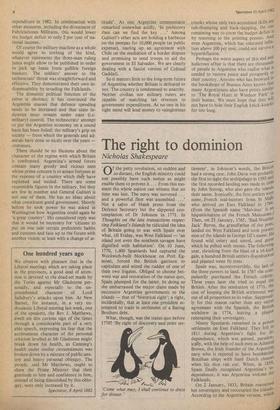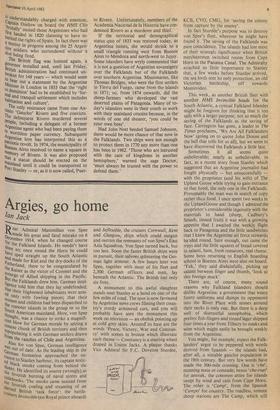The right to dominion
Nicholas Shakespeare
`Of the petty revolution, so sudden and so distant, the English ministry could not possibly have such notice as might enable them to prevent it ... From this mo- ment the whole nation can witness that no time was lost. The navy was surveyed ... and a powerful fleet was assembled ...' Not a salvo of blank prose from the Defence Secretary but the slippered con- templation of Dr Johnson in 1771. In Thoughts on the late transactions respec- ting Falkland's Islands he ridiculed the idea of Britain going to war with Spain over what, till Friday, was West Falkland — `an island not even the southern savages have dignified with habitation'. On 10 June, 1770, 1,400 Spaniards had captured the Woolwich-built blockhouse on Port Eg- mont, forced the British garrison to capitulate and seized the rudder of one of their two frigates. Obliged to choose bet- ween war and restoration of the status quo, Spain plumped for the latter. In doing so she embarrassed the major claim made by successive Argentine governments to the islands — that of `historical right'; a right, incidentally, that at least one president at- tempted to trade in settlemdnt of a Baring Brothers debt.
What, though, was the status quo before 1770? `By right of discovery and prior set-
`Come what may, I shall continue to dress for dinner.'
tlement', in Johnson's words, the British had a strong case. John Davis was probably the first to sight the archipelago in 1592 and the first recorded landing was made in 1690 by John Strong, who also gave the islands their name. Ironically, the first settlers were some French seal-hunters from St Mal" who arrived on East Falkland in 1764. (Even the Spanish name 'Malvinas' is an hispanicisation of the French Malouines.) Then, on 23 January, 1765, 'Bad-Weather Jack' Byron, the grandfather of the poet' landed on West Falkland and took posses- sion of the islands in George Ill's name. He found wild celery and sorrel, and geese which he pelted with stones. The followiu8 year, shrinking from the blast of a 16-knot gale, a hundred British settlers disembarked and planted some fir trees. Spain was, incontrovertibly, the last of the three powers to land. In 1767 she com- pulsorily purchased the French colony Three years later she tried to expel the British. After the restitution of 1771, the cost of keeping the British settlement was out of all proportion to its value. Supposed- ly for this reason rather than any secret agreement with the Spanish, the British withdrew in 1774, leaving a plague reiterating their sovereignty. Ninety Spaniards remained in a prisonsettlement on East Falkland. They left to 1811 during Argentina's fight for M- dependence, which was gained, paradox: ically, with the help of such men as Admiral Brown, the Irish founder of the Argentine, navy who is reputed to have bombarded Brazilian ships with hard Dutch cheeses when his shot ran out. When, in 1859' Spain finally recognised Argentina's 10- dependence, it was Argentina without the Falklands. On 2 January, 1833, Britain reasserted her sovereignty and reoccupied the islands. According to the Argentine version, which is understandably charged with emotion, Captain Onslow on board the HMS Clio brutally' ousted those Argentines who had first landed in 1820 claiming to have in- herited the rights of Spain. In fact there was a mutiny in progress among the 25 Argen- tine soldiers who surrendered without a shot being fired. The British flag was hoisted again, a governor installed and, until last Friday, British administration had continued un- broken for 149 years — which would seem to bear out a statement by the Argentine Minister in London in 1833 that the 'right to dominion' had to be established by 'for- Mal and tranquil settlement which includes habitation and culture'. The only resistance came from one An- tonio 'Gaucho' Rivero and five convicts. The delinquent Rivero murdered several People, including a delegate of a former Argentine agent who had been paying them M worthless paper currency. Subsequent Argentine lore has interpreted this as a Patriotic revolt. In 1974, the municipality of Buenos Aires resolved to name a square in memory of Rivero. It was also proposed that a statue should be erected on the Mainland until it could be transported to Port Stanley — or, as it is now called, Puer-
to Rivero. Unfortunately, members of the Academia Nacional de la Historia have con- demned Rivero as a murderer and thief.
If the territorial and demographical status quo of 1833 was restored today, as Argentina insists, she would shrink to a small triangle running west from Buenos Aires to Mendoza and north-west to Jujuy. Some islanders have wryly commented that it is not a question of Argentine sovereignty over the Falklands but of the Falklands over southern Argentina. Missionaries, like Thomas Bridges, who were the first settlers in Tierra del Fuego, came from the islands in 1871; so, from 1874 onwards, did the sheep-farmers who developed the vast deserted plains of Patagonia. Many of to- day's islanders went in their youth to work with their mainland cousins because, in the words of one old shearer, 'you could be your own boss'.
Had John Nott heeded Samuel Johnson, there would be more chance of that now in the Falklands. Two ships were not enough to protect them in 1770 any more than one has been in 1982. 'Those who are intrusted with the care of kingdoms in another hemisphere,' warned the sage Doctor, `must always be trusted with the power to defend them.'



































 Previous page
Previous page